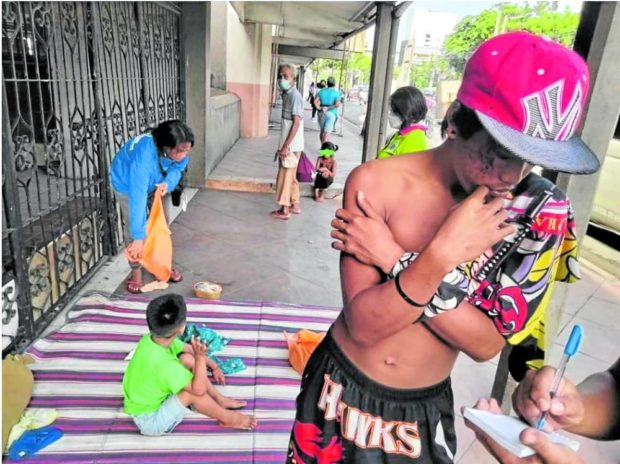
STREET HOME For this family, home is a spot on P. del Rosario Street in Cebu City. —PHOTO COURTESY OF CEBU CITY PUBLIC INFORMATION OFFICE
CEBU CITY, Cebu, Philippines — The local government is putting teeth on its ordinances that prohibit the giving and receiving of alms on the streets.
A composite team has been deployed on the streets to apprehend beggars, street dwellers and carolers on public utility vehicles (PUVs) as well as those giving money or food to mendicants, according to Dr. Lucille Mercado, head of the Cebu City Anti-Mendicancy Board (CCAMB).
Citation tickets would be issued to violators starting on Friday, Mercado announced at a news conference on Thursday.
Under City Ordinance No. 1631, which was enacted in 1996, giving or begging for alms in the streets is strictly prohibited. Penalty includes a fine of P1,000 or four-hour community service for both the almsgiver and the receiver.
City Ordinance No. 2304 also prohibits carolers along the streets and onboard any PUV. Its penalty ranges from a fine of P500 to five days of imprisonment or eight hours of community service.
‘Balik Probinsya’
Mercado said the CCAMB has received an order from Cebu City Mayor Michael Rama to strengthen the city’s anti-mendicancy campaign as part of his vision to transform this city into a metropolis like Singapore.
She urged individuals or groups who wanted to help street dwellers to coordinate with the local nutrition council, social welfare office or some charitable groups, including religious institutions.
Dr. Ester Concha, head of the Department of Social Welfare Services (DSWS), said more than 700 families in the city were considered mendicants or those who had no visible and legal means of support and instead use begging as a means of living.
“There is nothing wrong with giving alms, but to do it on the streets is not right. I think it’s high time to issue citation tickets to violators and put some teeth into our city ordinance,” she said.
Apart from apprehending mendicants, the DSWS also gave an option to nonresidents in the city to return to their hometowns through the “Balik Probinsya” program.
Concha said the DSWS was also willing to provide livelihood training to those who wanted to remain in the city so they would not have to beg on the streets.
Arresting teams
Raquel Arce, chief of the Cebu City Transportation Office (CCTO) and anti-mendicancy board member, said there were several attempts to stop open mendicancy.
“For the last six months, we rescued several street dwellers, fed them, and advised them to go home to their town. But they would always go back to the streets and beg. For so many years that the city extended humanitarian assistance to them, I think it’s high time to implement the law,” Arce said.
Designated to apprehend beggars and almsgivers were personnel from different departments such as the DSWS, the CCTO, the Cebu City Health Department, the Cebu Environmental Sanitation and Enforcement Team, and the city’s Prevention, Restoration, Order, Beautification and Enhancement Team.